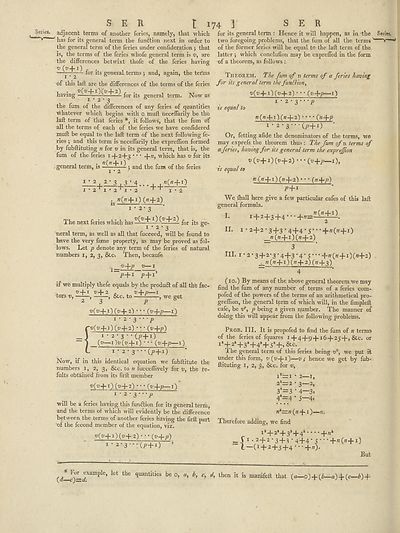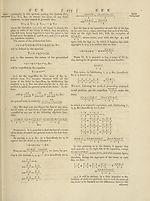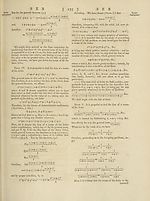Encyclopaedia Britannica, or, a Dictionary of arts, sciences, and miscellaneous literature : enlarged and improved. Illustrated with nearly six hundred engravings > Volume 19, Scripture-SUG
(184) Page 174
Download files
Complete book:
Individual page:
Thumbnail gallery: Grid view | List view

Seriet.
S E R t I
adjacent terms of another ferics, namely, that which
has for its general term the function next in order to
the general term of the feries under confideration ; that
is, the terms of the feries whofe general term is v, are
the differences betwixt thofe of the feries having
v (■y-f-1) . .
■—— *or lts general terms j and, again, the te/ms
of this laft are the differences of the terms of the feries
having ————- for its general term* Now as
the fum of the differences of any feries of quantities
■Whatever which begins with o muff heceffarily be the
laft term of that feries*, it follows, that the fum of
all the terms of each of the feries we have confidered
muft be equal to the laft term of the next following fe¬
ries ; and this term is neceffarily the expreflion formed
by fubftituting n for v in its general term, that is, the
fum of the feries i -j-2+3 * * * -J-», which has v for its
general term, is —^ $ and the fum of the feries
1 ‘ 2 , 2 • 3,3 * 4.. . , , «0-M)
2 ' I • 2 ' ' I
is ”(”+0 0+2)
1 . 2- 3
74 ] S E R
for its general term : Hence it will happen, as in the Series,
two foregoing problems, that the fum of all the terms
of the former feries will be equal to the laft term of the
latter ; which conclufion may be expreffed in the form
of a theorem, as follows :
Theorem. T/ie fum of n terms of a fries having
for its general term the funBion,
l) 2) • * * -l)
I * 2' f-p
is equal to
a04-i)(«-f 2) O-f/?
i * 2 • 3 •• • (y>+i)
Or, fetting afide the denominators of the terms, we
may exprefs the theorem thus : The fum of n terms of
a feries, having for its general term the exprejfion
K^+OO-i-2) • • *
is equal to
"O + Offt-H) • • • Q4;j)
T+i
We (hall here give a few particular cafes of this laft;
general formula.
The next feries which has —- 1 ^ 2-- for its ge-
i * 2 • 3 6
neral term, as well as all that fucceed, will be found to
have the very fame property, as may be proved as fol¬
lows. Let p denote any term of the feries of natural
numbers i, 2, 3, &c. Then, becaufe
v-\-p v—1
1=—— ,
T + 1 + i
if we multiply thefe equals by the produdl of all the fac-
-1
—, we get
={:
■y-j-i 1/4-2 0 v + p-
tors v, —4—, —L-, &.c. to -■
2 3 P
i/(i/-f-1) (i/-{- 2) • • • {v-^-p—1)
1 . 2 • 3
M^+t)(D-f.2) ’ (v+p)
_ i • 2 * 3 • • Cy?+i)
} o—Qi/(i> + i) ^ • • (y+p—1)
1 ‘ 2 - 3 •’’OH-1)
Now, if in this identical equation we fubftitute the
numbers 1, 2, 3, &c. to n fucceflively for v, the re-
fults obtained from its firft member
0 (^>+2) • • • (i>4-J9—x)
1 • 2 • 3 ' * * jo
will be a feries having this fun&ion for its general term,
and the terms of which will evidently be the difference
between the terms of another feries having the firft part
of the fecond member of the equation, viz.
i/0-fi)Q4-2) • -■ (1/4-^)
1 • 2'3**;(i>+0 *
I.
I + 2+3+4 * * * -f-«—
^«04-i)
II. 1 • 24-2*34-3 ‘4+4‘5*'*+«0+0
n (n4-i)(n4-2)
~T~
III. 1 • 2* 34-2'3 • 44-3 ’4' $ '*• +1)(«+2)
^.»(” + i)(;? + 2)(«+3)
4
(to.) By means of the above general theorem wre may
find the fum of any number of terms of a feries com-
pofed of the powers of the terms of an arithmetical pro-
greflion, the general term of which will, in the fimpleft
cafe, be vp, p being a given number. The manner of
doing this will appear from the following problems.
Prob. III. It is propofed to find the fum of n terms
of the feries of fquares 1 4-44.94.164-25+, &c. or
i* + 2*+31+4*+ 5*+, &c.
I he general term of this feries being 1/2, we put it
under this form, 1/f 1/4-1)—1/,• hence we get by fub¬
ftituting I, 2, 3, &c. for i»,
l*~l * 2—t,
2*—2 * 3—2,
3*=3 ‘ 4—3>
4*—4 • 5—4»
«*=«(» 4-I)—
Therefore adding, we find
i* + 2*4-3*4-4* 4.?/*
^V1 • 2 + 2'3 + 3 • 4+4’5'"+«(«+1)
l—(1 + 2+3+4'••+«)*
But
(i—^)0-JXample, 1Ct ^ <luantities beo» c> d> then it is manifeft that («—o) + {b—a) + (V—£) +
S E R t I
adjacent terms of another ferics, namely, that which
has for its general term the function next in order to
the general term of the feries under confideration ; that
is, the terms of the feries whofe general term is v, are
the differences betwixt thofe of the feries having
v (■y-f-1) . .
■—— *or lts general terms j and, again, the te/ms
of this laft are the differences of the terms of the feries
having ————- for its general term* Now as
the fum of the differences of any feries of quantities
■Whatever which begins with o muff heceffarily be the
laft term of that feries*, it follows, that the fum of
all the terms of each of the feries we have confidered
muft be equal to the laft term of the next following fe¬
ries ; and this term is neceffarily the expreflion formed
by fubftituting n for v in its general term, that is, the
fum of the feries i -j-2+3 * * * -J-», which has v for its
general term, is —^ $ and the fum of the feries
1 ‘ 2 , 2 • 3,3 * 4.. . , , «0-M)
2 ' I • 2 ' ' I
is ”(”+0 0+2)
1 . 2- 3
74 ] S E R
for its general term : Hence it will happen, as in the Series,
two foregoing problems, that the fum of all the terms
of the former feries will be equal to the laft term of the
latter ; which conclufion may be expreffed in the form
of a theorem, as follows :
Theorem. T/ie fum of n terms of a fries having
for its general term the funBion,
l) 2) • * * -l)
I * 2' f-p
is equal to
a04-i)(«-f 2) O-f/?
i * 2 • 3 •• • (y>+i)
Or, fetting afide the denominators of the terms, we
may exprefs the theorem thus : The fum of n terms of
a feries, having for its general term the exprejfion
K^+OO-i-2) • • *
is equal to
"O + Offt-H) • • • Q4;j)
T+i
We (hall here give a few particular cafes of this laft;
general formula.
The next feries which has —- 1 ^ 2-- for its ge-
i * 2 • 3 6
neral term, as well as all that fucceed, will be found to
have the very fame property, as may be proved as fol¬
lows. Let p denote any term of the feries of natural
numbers i, 2, 3, &c. Then, becaufe
v-\-p v—1
1=—— ,
T + 1 + i
if we multiply thefe equals by the produdl of all the fac-
-1
—, we get
={:
■y-j-i 1/4-2 0 v + p-
tors v, —4—, —L-, &.c. to -■
2 3 P
i/(i/-f-1) (i/-{- 2) • • • {v-^-p—1)
1 . 2 • 3
M^+t)(D-f.2) ’ (v+p)
_ i • 2 * 3 • • Cy?+i)
} o—Qi/(i> + i) ^ • • (y+p—1)
1 ‘ 2 - 3 •’’OH-1)
Now, if in this identical equation we fubftitute the
numbers 1, 2, 3, &c. to n fucceflively for v, the re-
fults obtained from its firft member
0 (^>+2) • • • (i>4-J9—x)
1 • 2 • 3 ' * * jo
will be a feries having this fun&ion for its general term,
and the terms of which will evidently be the difference
between the terms of another feries having the firft part
of the fecond member of the equation, viz.
i/0-fi)Q4-2) • -■ (1/4-^)
1 • 2'3**;(i>+0 *
I.
I + 2+3+4 * * * -f-«—
^«04-i)
II. 1 • 24-2*34-3 ‘4+4‘5*'*+«0+0
n (n4-i)(n4-2)
~T~
III. 1 • 2* 34-2'3 • 44-3 ’4' $ '*• +1)(«+2)
^.»(” + i)(;? + 2)(«+3)
4
(to.) By means of the above general theorem wre may
find the fum of any number of terms of a feries com-
pofed of the powers of the terms of an arithmetical pro-
greflion, the general term of which will, in the fimpleft
cafe, be vp, p being a given number. The manner of
doing this will appear from the following problems.
Prob. III. It is propofed to find the fum of n terms
of the feries of fquares 1 4-44.94.164-25+, &c. or
i* + 2*+31+4*+ 5*+, &c.
I he general term of this feries being 1/2, we put it
under this form, 1/f 1/4-1)—1/,• hence we get by fub¬
ftituting I, 2, 3, &c. for i»,
l*~l * 2—t,
2*—2 * 3—2,
3*=3 ‘ 4—3>
4*—4 • 5—4»
«*=«(» 4-I)—
Therefore adding, we find
i* + 2*4-3*4-4* 4.?/*
^V1 • 2 + 2'3 + 3 • 4+4’5'"+«(«+1)
l—(1 + 2+3+4'••+«)*
But
(i—^)0-JXample, 1Ct ^ <luantities beo» c> d> then it is manifeft that («—o) + {b—a) + (V—£) +
Set display mode to:
![]() Universal Viewer |
Universal Viewer | ![]() Mirador |
Large image | Transcription
Mirador |
Large image | Transcription
Images and transcriptions on this page, including medium image downloads, may be used under the Creative Commons Attribution 4.0 International Licence unless otherwise stated. ![]()
| Permanent URL | https://digital.nls.uk/192697674 |
|---|
| Attribution and copyright: |
|
|---|
| Description | Ten editions of 'Encyclopaedia Britannica', issued from 1768-1903, in 231 volumes. Originally issued in 100 weekly parts (3 volumes) between 1768 and 1771 by publishers: Colin Macfarquhar and Andrew Bell (Edinburgh); editor: William Smellie: engraver: Andrew Bell. Expanded editions in the 19th century featured more volumes and contributions from leading experts in their fields. Managed and published in Edinburgh up to the 9th edition (25 volumes, from 1875-1889); the 10th edition (1902-1903) re-issued the 9th edition, with 11 supplementary volumes. |
|---|---|
| Additional NLS resources: |
|

